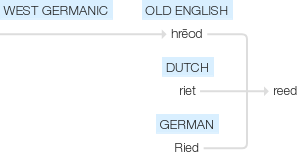Reed
Old English hrēod, of West Germanic origin; related to Dutch riet and German Ried .
wiktionary
From Middle English red, reed, from Old English hrēod, from Proto-West Germanic *hreud, of uncertain origin.
Akin to Saterland Frisian Rait(“reed”), West Frisian reid(“reed”), Dutch riet(“reed”), German Ried(“reed”). No cognates in North Germanic languages, but the existence of an otherwise unattested Gothic *𐌷𐍂𐌹𐌿𐌳( *hriud) was supposed by the brothers Grimm. [1] They also theorised that the word may have a relation to the retas mentioned in Noctes Atticae (Aulus Gellius). [1] The measuring reed sense is the translation of Akkadian qanûm ("cane") used in the Bible and elsewhere. [2]
From Middle English reden, from the noun (see above).
See ree.
From Middle English rede(“abomasum”), from Old English rēada, from Proto-West Germanic *raudō.
etymonline
reed (n.)
"tall, broad-leafed grass growing on the margins of streams or in other wet places," Middle English rēd, rede, from Old English hreod "reed, rush," from Proto-Germanic *kreut- "reed" (source also of Old Saxon hraid, Old Frisian hriad, Middle Dutch ried, Dutch riet, Old High German hriot, German Ried), with no known cognates beyond Germanic.
Meaning "musical pipe made from a reed stem" is from late 14c. (reed-pipe is from c. 1300). As part of the mouthpiece of a musical instrument it is attested from 1520s. Meaning "a reed instrument" is from 1838. Figuratively, as a type of frailty, etc., from early 13c.
